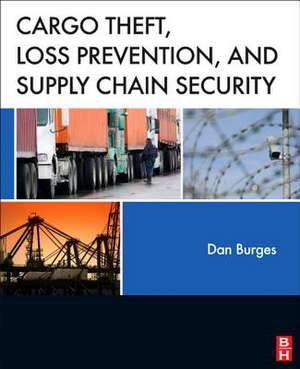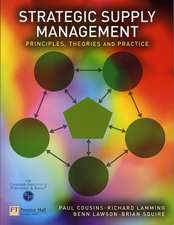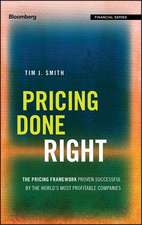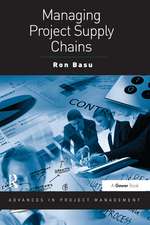Cargo Theft, Loss Prevention, and Supply Chain Security
Autor Dan Burgesen Limba Engleză Hardback – 18 iul 2012
- Outlines steps you can take to identify the weakest links in the supply chain and customize a security program to help you prevent thefts and recover losses
- Offers detailed explanations of downstream costs in a way that makes sense - including efficiency losses, customer dissatisfaction, product recalls and more - that dramatically inflate the impact of cargo theft incidents
- Provides a complete methodology for use in creating your own customized supply chain security program as well as in-depth analysis of commonly encountered supply chain security problems
Preț: 456.54 lei
Preț vechi: 592.91 lei
-23% Nou
Puncte Express: 685
Preț estimativ în valută:
87.37€ • 90.88$ • 72.13£
87.37€ • 90.88$ • 72.13£
Carte tipărită la comandă
Livrare economică 14-28 aprilie
Preluare comenzi: 021 569.72.76
Specificații
ISBN-13: 9780124160071
ISBN-10: 0124160077
Pagini: 392
Dimensiuni: 191 x 235 x 23 mm
Greutate: 0.82 kg
Editura: ELSEVIER SCIENCE
ISBN-10: 0124160077
Pagini: 392
Dimensiuni: 191 x 235 x 23 mm
Greutate: 0.82 kg
Editura: ELSEVIER SCIENCE
Public țintă
Primary-- manufacturing, logistics and security professionals: chief security officers, VPs of logistics or supply chain operations, security, logistics and supply chain managers; risk analysts, transportation managers, transportation company staff, security providers/vendors. Professionals in any company that manufactures, ships, transports, stores, distributes, secures or is otherwise responsible for bulk product and cargo. Secondary—students at undergraduate and graduate level, in MBA, supply chain management, criminal justice at both for-profit/career schools and higher edCuprins
PART I:
1. Cargo Theft 101
2. Cargo Theft Defined
3. Risk v. Reward
4. Organized Criminal Groups
5. Black Market
6. International Cargo Theft--A Warning for the US
7. Product Targeting
8. High Tech
9. Pharmaceuticals
10. The True Impact of Cargo Theft
PART II:
11. Determining Risk
12. Roles and Responsibilities
13. Physical Security
14. In-Transit Security
15. Active Monitoring
16. Air Cargo Security
17. Rail and Pipeline Security
18. Cargo Theft Task Forces and Organizations
19. Beyond Security
Appendix A In-Transit Security Drive Checklist
1. Cargo Theft 101
2. Cargo Theft Defined
3. Risk v. Reward
4. Organized Criminal Groups
5. Black Market
6. International Cargo Theft--A Warning for the US
7. Product Targeting
8. High Tech
9. Pharmaceuticals
10. The True Impact of Cargo Theft
PART II:
11. Determining Risk
12. Roles and Responsibilities
13. Physical Security
14. In-Transit Security
15. Active Monitoring
16. Air Cargo Security
17. Rail and Pipeline Security
18. Cargo Theft Task Forces and Organizations
19. Beyond Security
Appendix A In-Transit Security Drive Checklist
Recenzii
"…this book does a good job of describing the multitude of cargo theft challenges that security professionals face today…It is recommended reading for anyone who is involved in any aspect of supply chain security." --Security Management, June 2013
"Although the book has a decent stab at the subject on a global scale, it has an American centre of gravity describing the weave of theft across the union and the centres of conurbation. It ranges across the modes of transport, very properly remembering to include pipelines in its review. You could easily use this book as a course book for aspiring security professionals. Any underwriter of transport shipping and cargo links should take the time to order and read this book. The commonsense chapters on security precautions and risk management are it seems always sorely needed in the insurance industry. Reading the later chapters we are reminded how information on this form of crime has at least in part been freed up by the internet age and by specialist organisations who keep an idea on this form of economic activity… The book is well bound and printed and redolent of a sober American course book. The author's writing style seems to have been honed by his exposure to favoured techniques taught in the military. He tells you what he will say, says it and then summarises each laconic chapter. This is the book of a practical specialist rather than an academic one. It deserves to be on the shelves of people everywhere who are paid to care for cargo and to shield their goods from the depredations of criminals and to shelter their business results from parasitic losses." --Maritime Advocate Online, August 2012
"This work details the threat that cargo theft poses to the national economy, examines the impact of cargo theft on individual supply chain stakeholders, from manufacturers all the way to consumers, and provides a methodology for establishing supply chain security and loss prevention programs. The first part of the book explains basics of cargo theft in the 21st century, giving background on organized criminal groups and the black market, with separate chapters on high tech and pharmaceuticals. Part 2 describes methods for determining risk and outlines the roles and responsibilities of professionals in corporate security, insurance companies, third-party security providers, and law enforcement. This section also covers physical security, in-transit security, active monitoring, and issues in air, rail, and pipeline security. There is also an overview of cargo theft task forces and organizations. The book's reader-friendly layout offers many subheadings, bullet points, and chapter key points. Burges is a consultant in supply chain intelligence and risk analysis. Academic Press is an imprint of Elsevier." --Reference and Research Book News, October 2012
"Although the book has a decent stab at the subject on a global scale, it has an American centre of gravity describing the weave of theft across the union and the centres of conurbation. It ranges across the modes of transport, very properly remembering to include pipelines in its review. You could easily use this book as a course book for aspiring security professionals. Any underwriter of transport shipping and cargo links should take the time to order and read this book. The commonsense chapters on security precautions and risk management are it seems always sorely needed in the insurance industry. Reading the later chapters we are reminded how information on this form of crime has at least in part been freed up by the internet age and by specialist organisations who keep an idea on this form of economic activity… The book is well bound and printed and redolent of a sober American course book. The author's writing style seems to have been honed by his exposure to favoured techniques taught in the military. He tells you what he will say, says it and then summarises each laconic chapter. This is the book of a practical specialist rather than an academic one. It deserves to be on the shelves of people everywhere who are paid to care for cargo and to shield their goods from the depredations of criminals and to shelter their business results from parasitic losses." --Maritime Advocate Online, August 2012
"This work details the threat that cargo theft poses to the national economy, examines the impact of cargo theft on individual supply chain stakeholders, from manufacturers all the way to consumers, and provides a methodology for establishing supply chain security and loss prevention programs. The first part of the book explains basics of cargo theft in the 21st century, giving background on organized criminal groups and the black market, with separate chapters on high tech and pharmaceuticals. Part 2 describes methods for determining risk and outlines the roles and responsibilities of professionals in corporate security, insurance companies, third-party security providers, and law enforcement. This section also covers physical security, in-transit security, active monitoring, and issues in air, rail, and pipeline security. There is also an overview of cargo theft task forces and organizations. The book's reader-friendly layout offers many subheadings, bullet points, and chapter key points. Burges is a consultant in supply chain intelligence and risk analysis. Academic Press is an imprint of Elsevier." --Reference and Research Book News, October 2012










